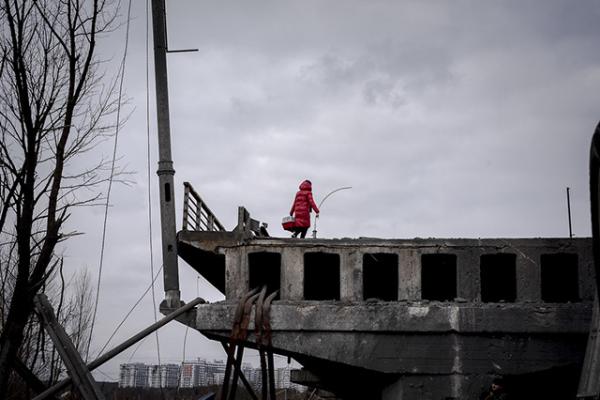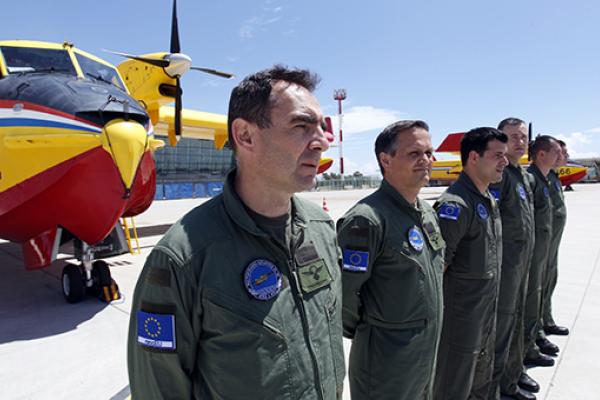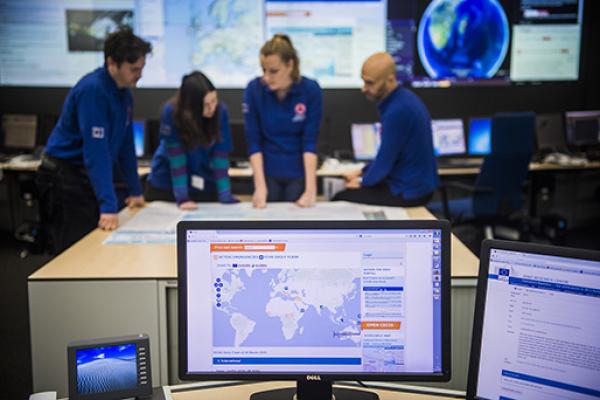Halyna’s daughter Sofiia was born with short bowel syndrome and oesophageal atresia, a rare congenital disability that prevents a baby from digesting food because their oesophagus has not formed properly. By the time she was 4 months old, she had already had multiple operations in Kyiv’s Okhmatdyt Children’s Hospital, the only specialist centre in Ukraine able to treat her complex conditions.
On 8 July 2024, the hospital was badly damaged in a Russian missile strike, part of a broader wave of attacks on Ukraine that left at least 33 people dead and more than 120 injured in Kyiv alone. The strike on the Okhmatdyt Children’s Hospital was particularly devastating, killing 2 people and leaving the country’s largest paediatric medical facility in ruins. Hundreds of children remain in need of urgent medical care.
“Fear, horror, all the terrible emotions that one can feel, you feel at that moment,” says Halyna. “Especially if you have a small sick child in your arms, it is very hard and scary. You stand and cry, and you don’t know what to do, where to run with this child. What’s more, Sofiia was on oxygen support at the time. It was very hard.”
All the operating rooms were destroyed; there was no light, no water and no possibility of providing Sofiia and other sick children the care they so urgently needed.
The EU-supported medical evacuation (Medevac) programme quickly stepped in to coordinate the transfer of 12 of the sickest children to hospitals elsewhere in Europe to continue their treatment. Since 2022, the programme, facilitated by the EU Civil Protection Mechanism (UCPM) in close cooperation with the Ministry of Health of Ukraine, and technical support from the World Health Organization (WHO), has transported more than 4,000 patients abroad for specialist medical care, helping to relieve some of the pressures on the Ukrainian health system caused by the war.
The programme connects Ukrainian patients with specialist trauma and cancer treatment, rehabilitation and prosthetic care in hospitals and rehabilitation centres across Europe.
A life in the balance
Sofiia and her mother had to stay in underground shelters after the attack, and unfortunately, the baby girl developed pneumonia prior to her medical evacuation. She had to be intubated and sedated for the gruelling, more-than-24-hour journey, which began on 17 July.
First, a convoy of ambulance buses took the children and their caregivers from Kyiv to Lviv in western Ukraine, then over the border to Rzeszów in Poland, where there is an EU Medevac Hub providing 24/7 medical support to patients before further transport.
From there, a specially equipped Medevac aircraft, co-funded by the EU and Norway, flew the children to various locations in Germany to receive care. The pilot flew at a low altitude so as not to put pressure on Sofiia’s fragile lungs. It was touch and go.
“Her condition was indeed serious,” says Halyna, recalling the day. “On the one hand, I was extremely worried, as I was told she might not survive the journey, but on the other hand, I was happy that there was a chance to save her.”
Thankfully, Sofiia was successfully transferred to the care of Stuttgart’s Olga Hospital, where she has gone on to receive several operations.
The future is looking optimistic for Sofiia, now 10 months old. She is able to play with toys and rolls over and her smile reveals 2 brand new teeth. In a few weeks, she is due to be discharged from the hospital, and all being well, will be able to return to Ukraine.
“I want to say a very big thank you, but there aren’t enough words, because the Medevac programme literally saved my child’s life. I am very thankful to the entire clinic in Stuttgart, Germany, to the whole team of this clinic, and to the entire team that helped to organise my child’s evacuation,” she says. “Just gratitude, gratitude for a lifetime, for saving my child’s life.”
The EU’s Medevac programme, coordinated through the European Commission’s Emergency Response Coordination Centre, remains a vital lifeline for Ukrainian patients needing urgent medical treatment abroad. The programme will continue as long as needed, ensuring patients receive the specialised care they require while supporting the resilience of Ukraine’s healthcare system.









